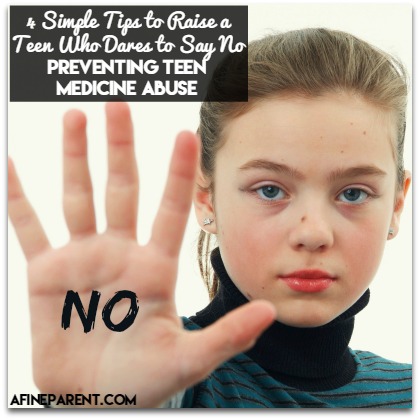 As parents, the numerous pressures our teens face every day can be just as – if not more – overwhelming to us than these pressures are to our teens.
As parents, the numerous pressures our teens face every day can be just as – if not more – overwhelming to us than these pressures are to our teens.
It’s easy to spend too much time thinking and worrying about our sons and daughters falling victim to risky behaviors, like over-the-counter (OTC) cough medicine abuse.
Conversely, sometimes we can get caught up in the “not my teen” mindset and never actually discuss risky behaviors with our teens.
Neither of these approaches are beneficial in raising strong teens who will say no to dangerous activities.
That said, what is beneficial is taking steps to help your teen navigate this transitional period in his or her life so he or she can confidently avoid and resist partaking in potentially harmful behaviors.
Use these four guidelines to raise a teenager who dares to say no:
#1 Educate your teen
Did you know that teens who learn about the dangers of drugs from their parents are 50% less likely to abuse drugs?
Without these important conversations taking place, teens are less likely to say no when presented with the opportunity to misuse substances, such as OTC cough medicine. However, the unfortunate reality is that 1 in 30 teens have reported OTC cough medicine abuse containing the active ingredient dextromethorphan (DXM), to get high.
While this statistic may not seem overly alarming, it’s also important to consider that 1 in 3 teens knows someone who has abused OTC cough medicine with the intention of getting high. In the context of a public high school classroom, this means that 10 teens in your son or daughter’s class know of someone who has abused OTC cough medicine and 1 teen in that class has abused OTC cough medicine personally. This alone really helps to put some perspective around the problem.
Further, only 59% of teens believe abusing OTC cough medicine to get high is risky.
In fact, teens may resort to OTC cough medicine abuse because they believe it is “less dangerous” than illegal drugs.
This belief may be enforced by the fact that this medicine is affordable, easily accessible and often used to safely treat coughs and colds.
As a parent, it is important that you and your teen discuss the dangers of ignoring the instructions on the Drug Facts label and taking excessive doses of cough medicine containing DXM. Explain to your teen that OTC cough medicine is, in fact, safe and effective when used appropriately, but that there are some very serious and unattractive side effects of DXM abuse like nausea, slurred speech and rapid heartbeat.
If you educate your teen about the dangers of OTC cough medicine abuse, your teen will be informed enough to make the right decision and more likely to say no to engaging in this risky activity.
#2 Monitor your teen
 This doesn’t mean becoming a helicopter parent and tracking your son or daughter’s every move. It means being open with your teen about how you plan to keep tabs on his or her social media activities and whereabouts after school. For example, you can start by establishing a social media contract or letting your son or daughter know that if he or she wants to join a new social network, you must have the passwords.
This doesn’t mean becoming a helicopter parent and tracking your son or daughter’s every move. It means being open with your teen about how you plan to keep tabs on his or her social media activities and whereabouts after school. For example, you can start by establishing a social media contract or letting your son or daughter know that if he or she wants to join a new social network, you must have the passwords.
If you are open with your teen as to why you want to keep up with his or her activities, this will promote a more transparent parent-teen relationship because your teen will understand where you are coming from and why you are making these decisions.
This will allow you to establish expectations about what will and will not be acceptable behavior. This will also allow your teen to earn your trust. Ultimately, this will encourage your teen to be more honest about his or her day-to-day activities and less likely to engage in risky behaviors without your knowledge.
#3 Communicate with your teen
While it may be uncomfortable, it’s important that you openly talk with your teen about the dangers of risky behaviors, such as OTC cough medicine abuse.
Start by asking open-ended questions that can prompt a candid dialogue between you and your teen. For example, present your teen with different scenarios in which he or she is asked to engage in some kind of potentially dangerous activity and ask how he or she would respond. If you’re still struggling or want more information on how to answer difficult questions your teen might pose, these tips from this kit may help.
By starting these conversations, your teen will learn about the consequences of making risky decisions and you can potentially strengthen your parent-teen relationship. Through consistent, open and honest communication, we can help empower our teens to be more resilient in the face of external pressures.
#4 Encourage your teen
Promote positive behaviors, pastimes and relationships. Your son or daughter will spend his or her teenage years trying to figure out who he or she is. The changes your teen is experiencing can take a toll on your parent-teen relationship, but don’t give up when he or she is trying to push you away.
You may also be left wondering why your teen is behaving in a certain way. The Partnership for Drug-Free Kids has provided insight into the teen brain that can help you understand why son or daughter has mood swings, among other behaviors. It may be frustrating at times but remember to make sure that your teen knows you are always available – through all the good times as well as when the going gets a bit tough.
At the end of the day, the best thing you can do you for your teen is to be supportive. Your teen, more than anything else, will appreciate your caring attitude if you provide encouragement in a respectful, but not overbearing way. Your son or daughter will be stronger in the face of adversity knowing that you are on his or her side. Even more, you will feel more confident that when you are not with your teen, he or she will be empowered to say no when faced with the decision to engage in a potentially harmful activity.
Leave a Reply